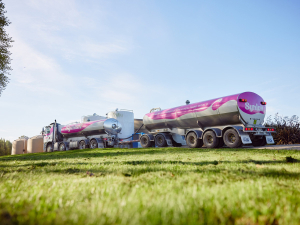Formula goes sour
OPINION: Media reports say global recalls tied to cereulide toxin contamination in milk-based nutrition brands could inflict combined financial losses exceeding $1 billion.
 Nestle is teaming up with Synlait and its 300 farmer suppliers to help fund innovative on-farm emissions reduction tools.
Nestle is teaming up with Synlait and its 300 farmer suppliers to help fund innovative on-farm emissions reduction tools.
One of the world’s largest dairy companies, Nestle is teaming up with Synlait and its 300 farmer suppliers to help fund innovative on-farm emissions reduction tools.
This investment is focused on pragmatic on-farm solutions that improve efficiency, such as effluent management systems, emissions-friendly feed options, advanced soil testing, alternative fertilisers and tree planting, splitting the costs three ways between Nestle, Synlait and its farmer suppliers across the next seven years.
Synlait chief executive Grant Watson says this new kind of customer partnership will help Synlait reach its greenhouse gas emission targets, as well as opening up potential new commercial opportunities to work together.
“This is a great example of proactive, industry-led solutions driving innovation across the supply chain, serving our customers’ demand for high quality, low-emissions products. Synlait’s industry-leading Lead With Pride programme has long financially incentivised Synlait farmers to produce some of the most sustainable dairy in the world, but this investment with Nestlé will help them go further, faster.”
“This partnership aims to reduce the cost of implementation and accelerate farmer adoption of emissions reduction tools. It’s leveraging technologies that are available in market right now, and will expand over time to include emerging technologies as they become available. This kind of agreement also opens up potential new opportunities to work together in other areas, and we look forward to a long and fruitful partnership with Nestlé.”
Nestle global chief procurement officer Patricia Stroup, speaking on a visit to New Zealand, says that partnerships of this kind which bring Nestlé together with farmers and processors, would be instrumental in all parties reaching their greenhouse gas emission targets.
“Dairy is both our single biggest ingredient by volume, and our largest source of Scope 3 greenhouse gas emissions, accounting for around 21% of our total emissions. None of us can do this alone. Knowing this drives us to find new ways of working together, and means we need to collaborate with our dairy suppliers to adopt new ways to reduce emissions, and with farmers to create plans for climate, methane and regenerative agriculture.
“While today’s announcement focuses on what can be delivered now, we are also continuing to develop new ways to reduce emissions through our own research, and external research partnerships. As our investigations continue, the most promising solutions are tested on research farms before being deployed more broadly. We are determined to draw on the best science worldwide, while ensuring that we deliver solutions that are locally relevant for farmers.”
Fonterra’s impending exit from the Australian dairy industry is a major event but the story doesn’t change too much for farmers.
Expect greater collaboration between Massey University’s school of Agriculture and Environment and Ireland’s leading agriculture university, the University College of Dublin (UCD), in the future.
A partnership between Torere Macadamias Ltd and the Riddet Institute aims to unlock value from macadamia nuts while growing the next generation of Māori agribusiness researchers.
A new partnership between Dairy Women’s Network (DWN) and NZAgbiz aims to make evidence-based calf rearing practices accessible to all farm teams.
Despite some trying circumstances recently, the cherry season looks set to emerge on top of things.
Changed logos on shirts otherwise it will be business as usual when Fonterra’s consumer and related businesses are expected to change hands next month.

OPINION: Here w go: the election date is set for November 7 and the politicians are out of the gate…
OPINION: ECan data was released a few days ago showing Canterbury farmers have made “giant strides on environmental performance”.